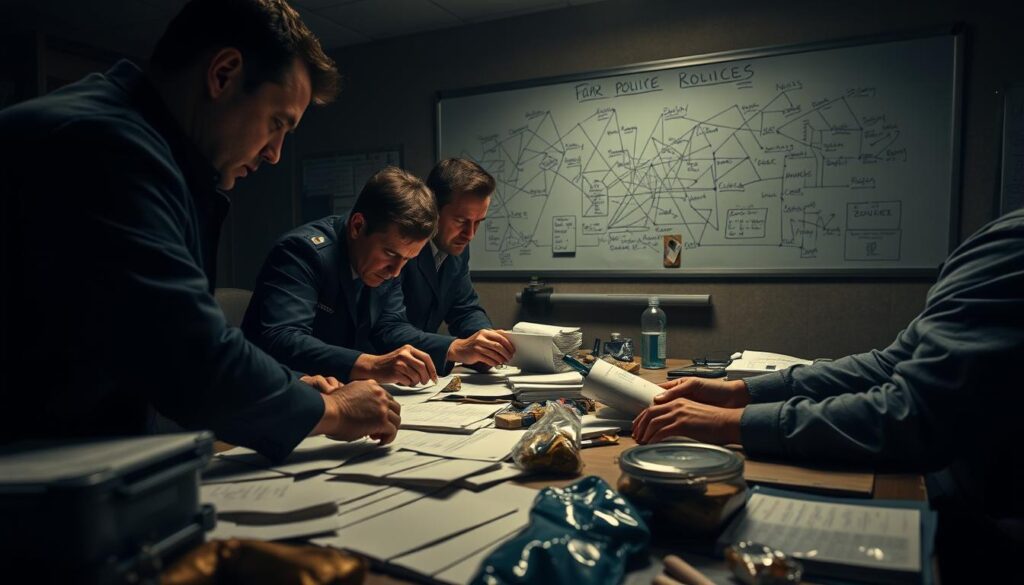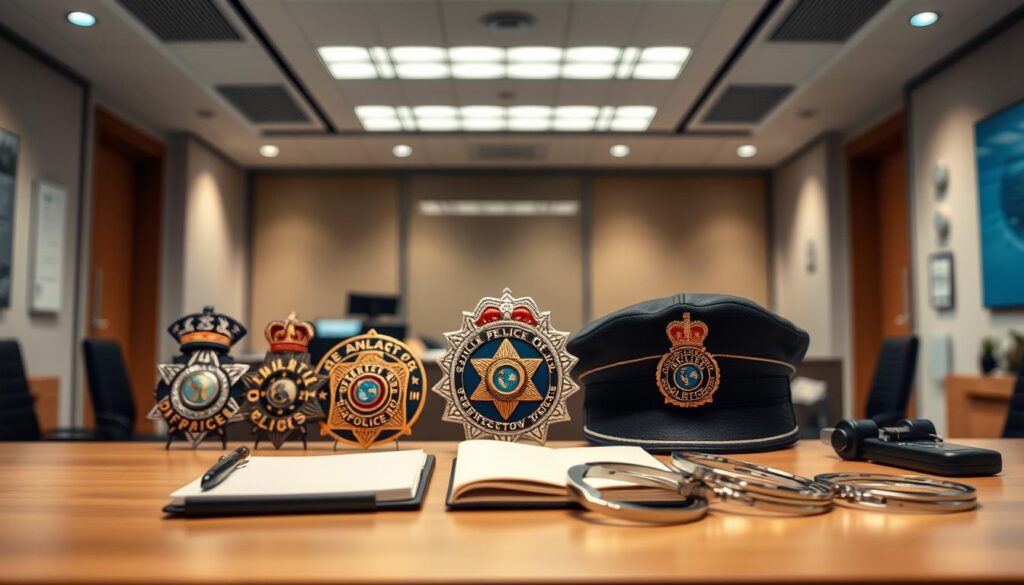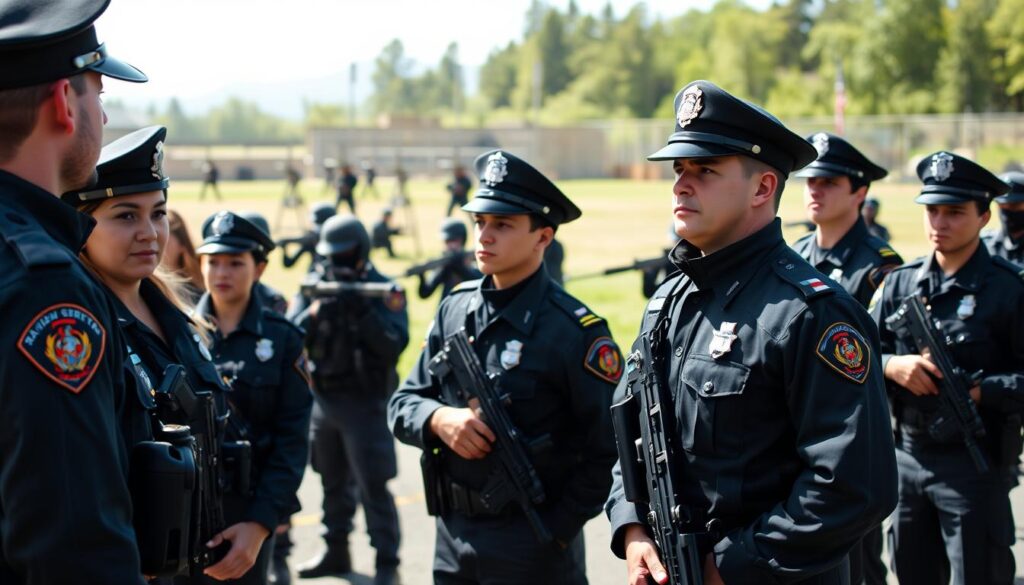Did you know over 85% of solved criminal cases in major Canadian cities involve specialized investigative work? Behind these successes are professionals dedicated to unraveling complex crimes while keeping neighborhoods safe.
Law enforcement roles demand more than just authority—they require sharp problem-solving skills and a commitment to public service. As a detective constable, you’d analyze evidence, interview witnesses, and collaborate with teams to prevent criminal activity before it escalates.
These positions exist at municipal, provincial, and federal levels. Whether working with the RCMP or urban departments like Toronto or Vancouver Police Services, your efforts would directly shape community safety. Training includes advanced courses in forensics, cybercrime, and conflict resolution.
Balancing fieldwork with administrative tasks, this career offers both challenges and rewards. You’ll need resilience to handle high-pressure situations and empathy to support victims. Ready to explore how this role strengthens Canada’s justice system?
Understanding the Role and Importance in Canadian Policing
Specialized police roles require a unique blend of analytical precision and community awareness. These professionals tackle intricate cases that demand methodical problem-solving while balancing public trust and legal standards.

Core Responsibilities in Action
Your daily duties would involve examining crime scenes, securing evidence, and interviewing those involved. Strong analytical skills help connect patterns in data, while attention to detail ensures reports withstand legal scrutiny. Collaboration with other officers is essential for resolving cases efficiently.
Strengthening Neighborhood Safety
Beyond investigations, your work directly impacts community safety. By identifying crime trends early, you help prevent escalation. Partnering with local organizations builds trust and encourages residents to share vital information. This proactive approach reduces risks and fosters safer environments.
One patrol officer noted: “Effective policing isn’t just enforcement—it’s about understanding what makes neighborhoods thrive.” Through this dual focus on law and relationships, you contribute to long-term stability.
Key Requirements for Detective Constable Canada
To pursue specialized investigative roles, candidates must clear specific educational and physical thresholds. These benchmarks ensure you’re prepared for the demands of crime-solving while maintaining public safety standards.

Minimum Education and Eligibility Criteria
You’ll need at least a Canadian high school diploma or equivalent. However, most agencies now require post-secondary education in fields like criminology or law enforcement. Completion of college programs or university degrees strengthens your application, especially when paired with certifications in forensic procedures.
Physical, Vision, and Hearing Standards
Your physical abilities must meet rigorous benchmarks. Strength and endurance tests assess your readiness for fieldwork. Vision requirements include full peripheral awareness and accurate colour perception—critical for analyzing evidence like bloodstains or surveillance footage.
| Standard | Requirement | Importance |
|---|---|---|
| Vision | 140° horizontal field | Detect hazards in peripheral zones |
| Hearing | 30 dB threshold | Hear whispers during interviews |
| Physical Fitness | 90th percentile in agility tests | Pursue suspects safely |
Hearing standards ensure you can process verbal cues in chaotic environments. Remember: exceeding minimum requirements gives you a competitive edge in selection processes.
Training and Education Pathways in Canadian Law Enforcement
Building a career in law enforcement starts with targeted education and hands-on preparation. Your journey begins in high school, where courses in social studies and physical education lay the groundwork. Many agencies recommend pursuing post-secondary programs in criminology or justice studies to strengthen your qualifications.
High School and Post-Secondary Training Programs
A high school diploma is the minimum requirement, but college programs in law enforcement significantly boost your competitiveness. Institutions like Seneca College or Justice Institute of British Columbia offer diplomas blending theory with practical skills. These programs often include internships with local agencies, giving you early exposure to investigative workflows.

| Agency | Program Length | Focus Areas |
|---|---|---|
| RCMP | 26 weeks | Federal law, firearms, crisis negotiation |
| Vancouver Police | 44 weeks | Urban patrol tactics, community engagement |
Specialised Certification and Training Courses
After basic police training, you’ll pursue certifications tailored to investigative roles. Forensic evidence collection and digital crime analysis courses refine your technical expertise. Many departments fund advanced workshops on interview techniques or surveillance technologies to keep skills current.
Starting with a solid educational foundation accelerates your path to specialized units. As one instructor notes: “The best investigators never stop learning—they adapt as crime evolves.” Continuous training ensures you’re prepared for emerging challenges.
Application Process and Assessment Procedures
Entering law enforcement requires navigating a multi-stage selection process designed to identify candidates who meet strict professional standards. Agencies like the Calgary Police Service typically complete evaluations within three to six months, though timelines vary. You’ll face rigorous assessments at every phase, with no guarantees of employment even if you pass all stages.
Steps to Apply for a Position
First, submit your application with proof of education and relevant work experience. If selected, you’ll complete written exams testing your understanding of criminal law and problem-solving abilities. Physical agility tests follow, simulating real-world scenarios like suspect pursuits or obstacle navigation.
Successful candidates then undergo psychological evaluations to assess stress tolerance and decision-making under pressure. A polygraph exam verifies your honesty about past conduct, while background checks scrutinize financial history and personal relationships. Final interviews often involve role-playing exercises with senior police officers.
Written, Physical, and Psychological Examinations
The written exam evaluates analytical skills through case studies and legal terminology quizzes. Physical tests measure strength using timed runs, push-ups, and simulated resistance drills. One recruiter notes: “We look for candidates who treat these assessments as job previews—not just checkboxes.”
Psychological screenings use standardized tools like the MMPI-3 to identify traits aligning with Canadian police values. You’ll discuss hypothetical scenarios to demonstrate empathy and ethical judgment. Remember: agencies compare candidates throughout the application process, so consistency matters more than perfection.
Preparing for the Demands of Policing
What does it take to thrive in a career where no two shifts are alike? Police work demands constant adaptability, whether you’re responding to emergencies at 3 AM or analyzing evidence during daylight hours. Success hinges on balancing physical stamina with psychological resilience.

Developing Physical Agility and Mental Readiness
Your training must mirror real-world conditions. Build endurance through high-intensity interval training and strength exercises like weighted carries. These simulate chasing suspects or lifting injured civilians. Coordination drills using obstacle courses improve reaction times during foot pursuits.
Mental preparation matters equally. Practice stress-reduction techniques like tactical breathing during simulated crisis scenarios. One training officer emphasizes: “Controlling your heart rate keeps your mind clear when seconds count.” Regular exposure to decision-making drills sharpens your ability to assess risks under pressure.
| Hazard Type | Common Scenarios | Mitigation Strategies |
|---|---|---|
| Equipment Risks | Firearm handling during arrests | Weekly safety checks & scenario drills |
| Environmental Threats | Ice-covered crime scenes | Specialized footwear & team protocols |
| Psychological Stress | Hostage negotiations | Debriefing sessions & peer support |
Understanding Enforcement and Safety Challenges
Shift work disrupts sleep patterns, requiring disciplined routines. Use blackout curtains and consistent meal times to maintain energy during overnight duties. Your work environment shifts rapidly—from heated patrol cars to rain-soaked crime scenes. Always layer clothing for quick adaptation.
Safety protocols become second nature. Inspect gear before each shift, and mentally map exit routes in unfamiliar areas. Enforcement duties often involve split-second judgments—like determining when to escalate force. Regular scenario training builds the muscle memory needed for these critical decisions.
Building Essential Skills for a Successful Career
Success in investigative roles hinges on mastering three core skill sets that bridge human interaction and technical expertise. These competencies determine how effectively you gather truth, protect communities, and uphold justice.

Interpersonal and Communication Competencies
Your ability to extract crucial details depends on active listening and clear dialogue. Practice rephrasing questions during mock interviews to uncover inconsistencies in witness accounts. When drafting reports, use plain language that withstands courtroom scrutiny.
Analytical and Investigative Skill Development
Sharpen your pattern recognition through evidence categorization exercises. Learn to separate relevant facts from background noise in surveillance footage or digital records. One training exercise involves reconstructing timelines from fragmented data sources.
Leadership and Decision-Making Abilities
Develop crisis prioritization techniques through scenario-based drills. A senior instructor advises: “Treat every decision as dominoes—consider what chain reactions your choices might trigger.” Role-play coordinating multi-unit responses to bank heists or cybercrime operations.
These skills evolve through ongoing practice. Regular workshops on emerging forensic technologies keep your methods current. Remember—effective police work blends textbook knowledge with street-smart adaptability.
Navigating Career Progression in Canadian Policing
Charting your path in law enforcement offers multiple routes for growth beyond entry-level roles. Whether transferring between agencies or climbing ranks within your organization, strategic planning maximizes your impact.
Opportunities for Lateral Entry and Advancement
Many police services streamline transfers for experienced officers. The Winnipeg Police Service, for example, accepts lateral entries from other Canadian organizations. You’ll need:
- Two years of continuous service post-training
- Eligibility for honorable discharge
- Certification matching their standards
| Agency | Experience Required | Specializations Available |
|---|---|---|
| Royal Canadian Mounted Police | 3+ years | Border Security, Cybercrime |
| Vancouver Police | 2 years | Homicide, Financial Crimes |
Insights from Various Canadian Law Enforcement Agencies
Career paths vary across organizations. The Royal Canadian Mounted Police lets you work internationally or specialize in marine services. Municipal departments often promote from within based on performance and training completion.
One senior officer notes: “Advancing requires both field experience and classroom learning—they’re two sides of the same badge.” Regular skill upgrades through courses on digital forensics or leadership make you competitive for promotions.
Your progression might look like this:
- Cadet training completion
- Patrol officer assignments
- Specialized investigative roles
- Commissioned officer positions
Conclusion
Your path to a meaningful career in law enforcement offers both stability and purpose. With median salaries reaching $87,859 and strong wage growth projections, police work provides competitive compensation alongside community impact. Major organizations like the RCMP and municipal services offer starting salaries between $53,000-$70,000, with rapid increases for skilled officers.
The field demands rigorous training completion and adherence to high ethical standards. Through specialized programs, you’ll gain expertise in areas like forensic analysis or cybercrime investigations. Canadian police organizations value adaptable professionals who balance fieldwork with strategic problem-solving.
This career lets you shape safer neighborhoods while advancing through diverse roles. From urban patrols to federal task forces, policing evolves with your skills and ambitions. Your dedication to justice strengthens trust between communities and those sworn to protect them.
Ready to join professionals safeguarding Canada’s future? Take the first step today toward a role where every solved case reinforces public safety.

